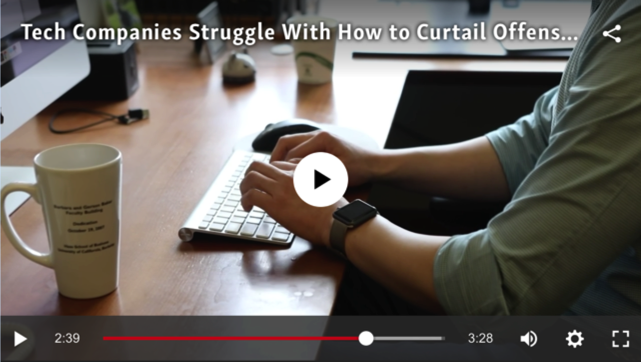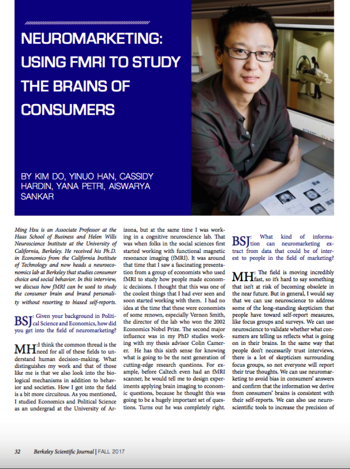Gamble like you're a subject in our study
Zhihao Zhang receives Career Transition Award
New paper on model that predicts stereotype's effects on behavior and outcomes
Jenkins AC, Karashchuk P, Zhu L & Hsu M. Predicting human behavior toward members of different social groups. Proceedings of the National Academy of Sciences. 2018.
Abstract:
Disparities in outcomes across social groups pervade human societies and are of central interest to the social sciences. How people treat others is known to depend on a multitude of factors—e.g., others’ gender, ethnicity, or appearance—even when these should be irrelevant. However, despite substantial progress, much remains unknown regarding (i) the set of mechanisms shaping people’s behavior toward members of different social groups and (ii) the extent to which these mechanisms can explain the structure of existing societal disparities. Here we show in a set of experiments the important interplay between social perception and social valuation processes in explaining how people treat members of different social groups. Building on the idea that stereotypes can be organized onto basic, underlying dimensions, we first found using laboratory economic games that quantitative variation in stereotypes about different groups’ warmth and competence translated meaningfully into resource allocation behavior toward those groups. Computational modeling further revealed that these effects operated via the interaction of social perception and social valuation processes, with warmth and competence exerting diverging effects on participants’ preferences for equitable distributions of resources. This framework successfully predicted behavior toward members of a diverse set of social groups across samples and successfully generalized to predict societal disparities documented in labor and education settings with substantial precision and accuracy. Together, these results highlight a common set of mechanisms linking social group information to social treatment and show how pre-existing, societally shared assumptions about different social groups can produce and reinforce societal disparities.
Voice of America: Curtailing Offensive Speech and the Fragility of Common Sense
On the one hand, the bias against certain groups is so obvious as to be common sense. On the other hand, get outside of these "common sensical" categories and things get really controversial, really fast. Are rural Americans biases against? What about working class? Is there pervasive bias against caucasians?
I think most of us have heard these and similar claims. So the question I would like to pose is, can we validate these claims in some way? Even if we find some of these claims offensive, and the people making these claims odious, can we nevertheless test these claims rigorously, and either validate or falsify them in a fact-based, data-driven manner?
Since our forthcoming paper on the topic is still under embargo, I will leave things a bit vague here, and just say that I think we are beginning to develop tools that may finally answer these difficult questions. So, as lame as it might sound, stay tuned...
Cross posted on faculty page.
Note to prospective graduate students
New paper on understanding how the brain makes decisions using intracranial recordings
Encoding of multiple reward-related computations in transient and sustained high-frequency activity in human OFC
Authors: Ignacio Saez, Jack Lin, Arjen Stolk, Edward Chang, Josef Parvizi, Gerwin Schalk, Robert T. Knight1, and Ming Hsu
ABSTRACT
Human orbitofrontal cortex (OFC) has long been implicated in value-based decision-making. In recent years, convergent evidence from human and model organisms have further elucidated its role in representing reward-related computations underlying decision-making. However, a detailed description of these processes remains elusive, due in part to (i) limitations in our ability to observe human OFC neural dynamics at the timescale of decision processes, and (ii) methodological and interspecies differences that make it challenging to connect human and animal findings or to resolve discrepancies when they arise. Here we sought to address these challenges by conducting multi-electrode electrocorticography (ECoG) recordings in neurosurgical patients during economic decision-making to elucidate the electrophysiological signature, sub-second temporal profile, and anatomical distribution of reward-related computations within human OFC. We found that high frequency activity (HFA, 70-200Hz) reflected multiple valuation components grouped in two classes of valuation signals that were dissociable in temporal profile and information content: (i) fast, transient responses reflecting signals associated with choice and outcome-processing, including anticipated risk and outcome regret, and (ii) sustained responses explicitly encoding what happened in the immediately preceding trial. Anatomically, these responses were widely distributed in partially overlapping networks, including regions in the central OFC (Brodmann Areas 11 and 13) which have been consistently implicated in reward processing in animal single unit studies. Together, these results integrate insights drawn from human and animal studies and provide evidence for a role of human OFC in representing multiple reward computations.
Ignacio and Weilun Going Away Dinner
From left: Ignacio Saez, Weilun Ding, Max Good, Siyana Hristova, Zhihao Zhang, Gil Sharvit, Ming Hsu, and Nick Angelides.
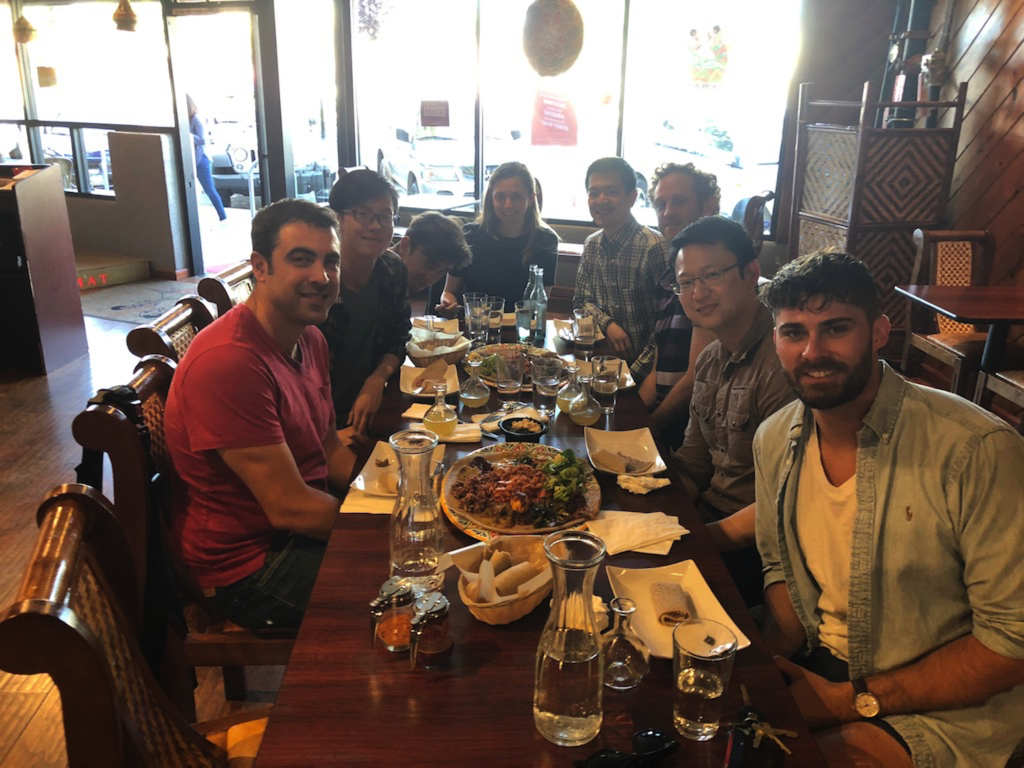
Anna Going Away Dinner
From left: Weilun Ding, Gil Sharvit, Anna Jenkins, Zhihao Zhang, Ming Hsu, and Nick Angelide
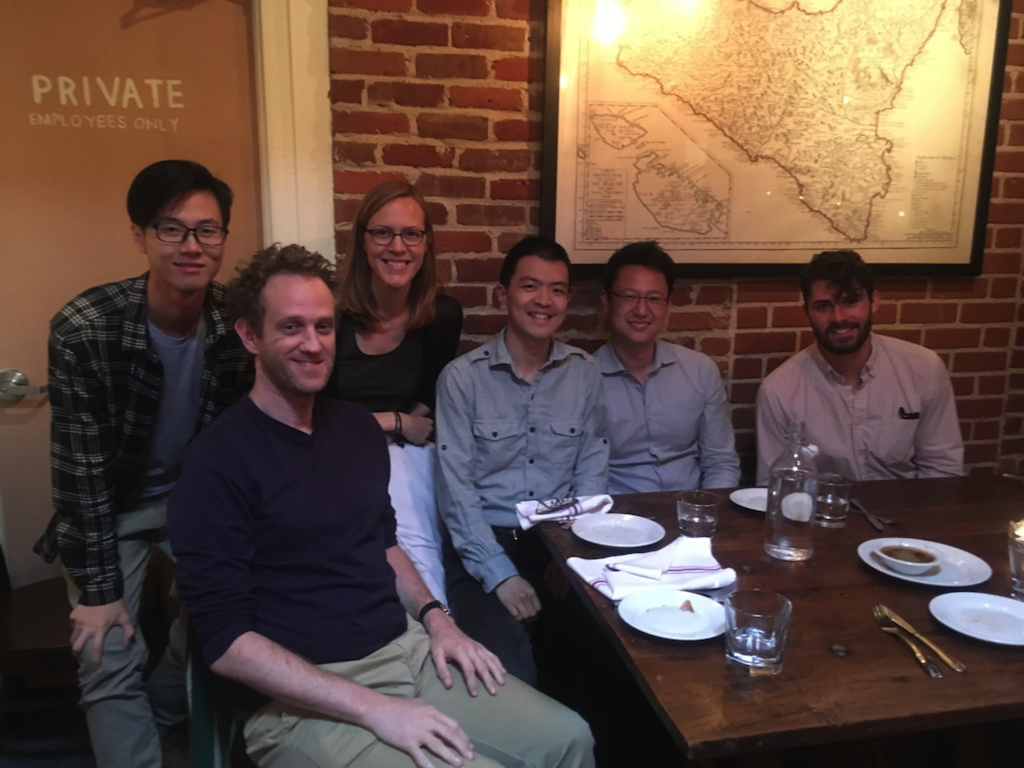
Ekaterina Goncharova undergraduate research poster
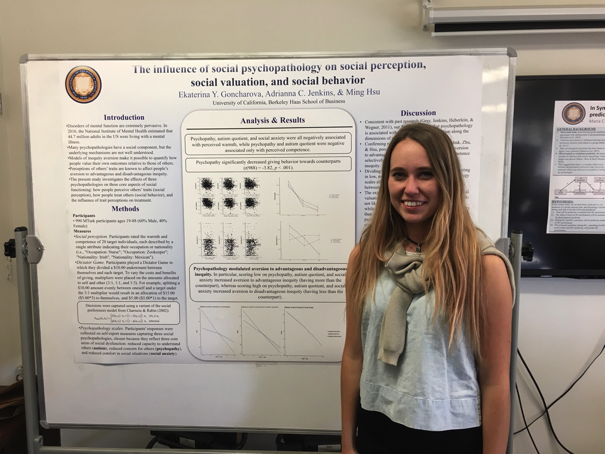
Ignacio Saez starting as assistant professor at UC Davis in Fall

He will be starting as assistant professor in the neurosurgery department at UC Davis Medical School this coming fall.
Congratulations Ignacio!
Gil Sharvit awarded ICBS seed grant
CRCNS PI Meeting 2018

Anna Jenkins Named APS Rising Star

Congratulations Anna!The Rising Star designation recognizes outstanding psychological scientists in the earliest stages of their research career post-PhD whose innovative work has already advanced the field and signals great potential for their continued contributions.
